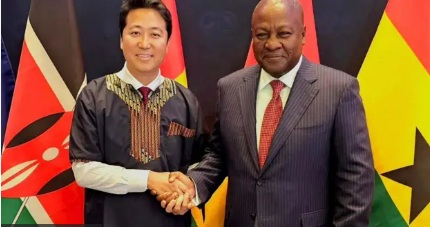With less than 48 hours to go before my deadline for submission for last week’s column, my article had literally been written ― in my head, that is.
I was just waiting for it to marinate for a little longer before hitting my laptop keyboard.
With news of the death of music legend Daddy Lumba, I had to suspend my piece as I rummaged through my thoughts on the institution that the man was and represented.
Ambassador Choi
The recent appointment by President Mahama of Mr. Kojo Choi, a Korean-born Ghanaian businessman, as Ghana’s Ambassador-designate to the Democratic Republic of South Korea raised quite some commentary on various media platforms, given his Asian roots.
Some raised eyebrows notwithstanding. I believe there was a generally warm reception to the news.
Born in South Korea, Choi relocated to Ghana at the age of 14, where he later acquired Ghanaian citizenship by naturalisation, despite the obviously superior international advantages and opportunities his South Korean citizenship at birth offered him.
His deep ties to Ghana were strengthened through his education at SOS College in Tema, followed by his studies at the University of Ghana, Legon, where he earned a degree in Business Administration in 2002.
Over the years, Kojo has carved a niche for himself within both Ghanaian and Korean circles, acting as a cultural and business bridge between the two nations.
Precedents, home, abroad
Far from Mr Choi being the first high-profile political appointee of foreign extraction in our republic, there is some precedent.
Under Dr Kwame Nkrumah, Geoffrey Bing (QC), a white British lawyer, was the country’s first Attorney-General from 1957 to 1961.
Under Flt-Lt. J.J. Rawlings, a white lady, Mrs Valerie Sackey, was the Director of the Castle Information Bureau during the PNDC era from 1982 to 1992 and wielded enormous power.
She went on to head the Public Affairs Secretariat at the office of President Rawlings under the NDC from 1992 to 2001.
Mrs Shirley Ababio, another major figure in the P/NDC era, was also of white European extraction.
Similarly, many people of Ghanaian ancestry who hold other nationalities have found themselves elected or appointed to significant public offices in those countries.
In the UK, for example, Lord Paul Boateng was one of the first three black people to be elected to the British Parliament in 1987. Kwasi Kwarteng was appointed Chancellor of the British Exchequer in 2022, and the current British MP for Erith and Thamesmead is Ms. Abena Oppong-Asare.
In 2010, Ghana-born Dr Peter Bossman became the first black mayor in Eastern Europe after he was elected in Piran, South-West Slovenia, whilst last year, Gabe Felix Kofi Amo was elected into the US Congress. Other examples abound.
Meaning of ‘Ghanaian’
For many Ghanaians, the legitimacy of someone‘s claim to be Ghanaian is tied to where in Ghana the claimant hails from, per their family roots (which in turn defines their ethnicity).
The ‘hometown question’ features both in personal conversations and also appears on official application forms.
In the popular psyche, being Ghanaian is also tied to a person’s name, by which his or her ethnicity (and, therefore, ‘Ghanaianess’) may be deduced and authenticated.
A friend who bears his Nigerian father’s surname and whose mother is Ghanaian always finds himself explaining his roots when people are surprised about his claimed Ghanaian nationality and even routinely challenge it.
What this means is that whilst a person of foreign extraction may, by law, naturalise as a Ghanaian on grounds of long residence here or marriage to a Ghanaian, or have some Ghanaian blood, he or she may face legitimacy challenges in certain minds because of the ‘wrong’ skin colour, a ‘non-Ghanaian’ name or not fitting neatly into a local ethnic group.
This non-alignment between legal definitions and popular notions is what drove the eyebrow raising, in the case of Mr Choi, who is a fully naturalised Ghanaian citizen, and, therefore, fully qualifies for the appointment.
21st-century realities
In many Western countries where black presence has been a regular feature for many years, the notion of blacks in public life has been normalised over the years.
The normalisation took place over a very long time, and in places like the US, even voting rights for black people only became a reality as recently as the mid-1960s.
In both the US and the UK, these public office achievements were bitterly fought for and wildly celebrated.
The narrative was that even if they were born in those countries and were citizens by birth or had been naturalised, by their skin colour, they were not really deemed authentic enough and, therefore, had no stake in the politics of those countries.
In Ghana, many Syrians and Lebanese have migrated to Ghana and have built their lives here over the decades, and I am sure a great number of them have acquired Ghanaian nationality due to the various advantages this offers them.
But generally, they tend to be focused on the retail and other industries and so find themselves below the radar of public scrutiny that political office holders and seekers are usually subjected to.
The reality of the 21st century is that with time, it is likely that more people from other countries will settle in Ghana due to investment opportunities.
Already, gold-mining communities have seen a huge influx of Chinese nationals over the years, whilst the Nigerian population is quite considerable.
Eventually, some of their naturalised children or grandchildren, born and/or raised here, may legitimately seek public office.
Eventually, therefore, we must brace ourselves and re-evaluate who in our minds a Ghanaian really is, in order to align with what the law says ― that being Ghanaian goes beyond one’s name, a dark skin and a blood lineage to one of our towns and villages as one’s hometown.
I wish Ambassador Choi well in his new role.
Rodney Nkrumah-Boateng
E-mail: rodboat@yahoo.com

